英语形容词,副词及动词短语
高考英语复习形容词和副词知识点讲解讲义(必考点)
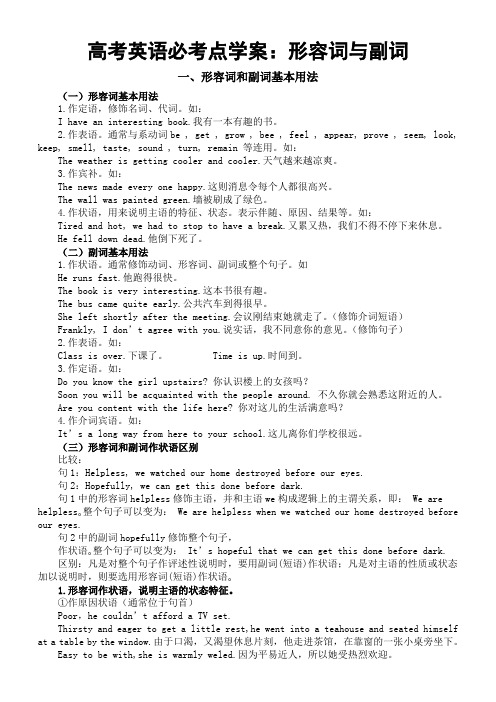
高考英语必考点学案:形容词与副词一、形容词和副词基本用法(一)形容词基本用法1.作定语,修饰名词、代词。
如:I have an interesting book.我有一本有趣的书。
2.作表语。
通常与系动词be , get , grow , bee , feel , appear, prove , seem, look, keep, smell, taste, sound , turn, remain 等连用。
如:The weather is getting cooler and cooler.天气越来越凉爽。
3.作宾补。
如:The news made every one happy.这则消息令每个人都很高兴。
The wall was painted green.墙被刷成了绿色。
4.作状语,用来说明主语的特征、状态。
表示伴随、原因、结果等。
如:Tired and hot, we had to stop to have a break.又累又热,我们不得不停下来休息。
He fell down dead.他倒下死了。
(二)副词基本用法1.作状语。
通常修饰动词、形容词、副词或整个句子。
如He runs fast.他跑得很快。
The book is very interesting.这本书很有趣。
The bus came quite early.公共汽车到得很早。
She left shortly after the meeting.会议刚结束她就走了。
(修饰介词短语)Frankly, I don’t agree with you.说实话,我不同意你的意见。
(修饰句子)2.作表语。
如:Class is over.下课了。
Time is up.时间到。
3.作定语。
如:Do you know the girl upstairs? 你认识楼上的女孩吗?Soon you will be acquainted with the people around. 不久你就会熟悉这附近的人。
英语之中名词 代词 动词 形容词 冠词 数词 副词 介词 连词 感叹词

(一)1、名词名词(Nouns)是词性的一种,也是实词的一种,是指待人、物、事、时、地、情感、概念等实体或抽象事物的词。
名词可以独立成句。
在短语或句子中通常可以用代词来替代。
2、代词是代替名词的一种词类。
大多数代词具有名词和形容词的功能。
英语中的代词,按其意义、特征及在句中的作用分为:人称代词、物主代词、指示代词、自身代词、相互代词、疑问代词、关系代词和不定代词八种。
3、动词,就是用来形容或表示各类动作的词汇。
基本上每个完整的子句都有一个动词,要表示第二个动作时可使用不定词、动名词、对等连接词、从属连接词或增加子句等方法连结。
根据其在句中的功能,动词可分为四类。
4、形容词形容词【adjective】很多语言中均有的主要词类中的一种。
主要用来修饰名词的词,表示事物的特征5、冠词的定义冠词是置于名词之前,对名词起限制作用的一种虚词。
冠词可以说是名词的一种标志,它不能离开名词而独立存在。
冠词的分类冠词分为不定冠词"a,an"、定冠词"the"和零冠词三种6、数词表示"多少"和"第几"的词,叫数词。
其用法相当于名词或者形容词。
数词分为基数词和序数词两种。
表示数目多少或顺序多少的词叫数词,数词分为基数词和序数词。
7、副词(Adverb)副词的定义: 副词是一种用来修饰动词,形容词,副词或全句的词,说明时间,地点,程度,方式等概念。
8、介词的定义和特征介词是一种用来表示词与词, 词与句之间的关系的词。
在句中不能单独作句字成分。
介词后面一般有名词代词或相当于名词的其他词类,短语或从句作它的宾语。
(二)1、名词,人或事物的名称3、代词,代替名词或者数词(比如some就是代替数目)3、动词,动作或状态4、数词,表示数目或顺序(比如序数词,5th就是表示顺序)5、形容词,人或事物的性质或状态(因为形容词一般修饰名词)6、副词,动作的特征或性状特征(因为副词一般修饰动词或形容词)7、冠词,表示名词的泛指或特指8、介词,表示名词或代词与其他词的关系(因为介词后面一半紧跟名词,代词或其他名词性结构)9、连词,连接词与词,短语与短语,句子与句子10、感叹词,表示说话时的感情或语气(三)1、adj. / a. 形容词用来描述一类物质的性质,状态,外貌,或人的性格特点,性质,品格如:big,happy2、adv. / ad. 副词用来修饰动作或形容词,一般在句子中做状语用表示动作的进行怎样,或表示程度,特点,如:clearly,happily3、prep. 介词连接地点,时间的一类词语,可以表示方位,时间.跟一些表示时间,地点的词连用表示介词词组如:in,to,on,under4、conj. 连词用来连接时间,地点,原因,结果的一类词语如:when,beacuse,so5、num. 数词表示数字的词,既可以是基数词,也可以是序数词如:one,two,first6、int. 感叹词表示感叹的一类词,一般不加一解释,只代表感叹如:what,how,haurray7、vt. 及物动词(后面要加宾语)行为动作的词如:do,finish,play8、vi. 不及物动词(后面不加宾语)表示行为动作的词如:appear9、n. 名词表示物体,物质的词如:pig,cow,man10、pron. 代词代指一类人,事或物的词如:he,she,hers,his,things11、art = 冠词,article的缩写(四)在英语语法中主要把词分为8大类:1.名词:表示人、物或地方等,如:John,teacher;table,pen;London;beauty.2.代词:用来代替名词,以避免重复某个名词,如:I,you,it,that,those,them.3.形容词:用来修饰或限制某个(些)名词,如:good(man),white (paper),every(book),much(water),(John is)hon-est,(He seems)lazy.被修饰或限制的名词,叫做主体词(head-word)。
小升初英语--形容词-副词
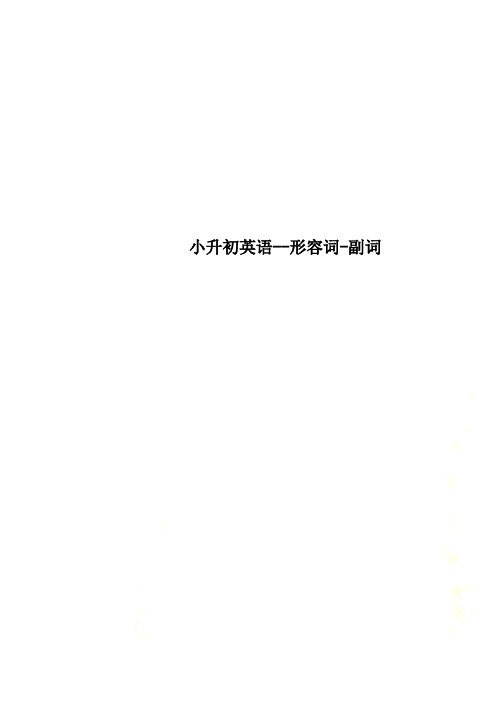
小升初英语--形容词-副词小升初英语形容词、副词(一)知识点一、形容词副词1.形容词:形容词(adjective),简称adj.很多语言中均有的主要词类中的一种。
主要用来修饰名词的词,表示事物的特征。
形容词用来修饰名词或代词,表示人或事物的性质、状态,和特征的程度好坏,与否.例:Tom is my good friend. He is tall. She is beautiful.2.副词副词在句子中修饰动词,形容词,副词或整个句子。
用来说明动作或状态的特征,时间,地点,程度,方式等情况。
1)副词按其用途和含义可分为下面五类:➢时间副词:时间副词通常用来表示动作的时间。
常见的时间副词有:now ,today, tomorrow, early。
He often comes to school late. What are we going to do tomorrow?➢地点副词:地点副词通常用来表示动作发生的地点。
常见的地点副词有:here, there, home, down, up, off, on, in, out等。
:I met an old friend of mine on my way home.➢方式副词:方式副词一般都是回答“怎样的?”这类问题的。
常见的方式副词有:badly, carefully, suddenly, happily, slowly, well, fast, The old man walked home slowly. Please listen to the teacher carefully. ➢程度副词:程度副词多数用来修饰形容词和副词,有少数用来修饰动词或介词短语。
常见的程度副词有:much, (a) little, a bit, very, so, too。
She sings quite well. I can hardly agree with you.➢疑问副词:用来引导特殊疑问句的副词。
英语词性和时态
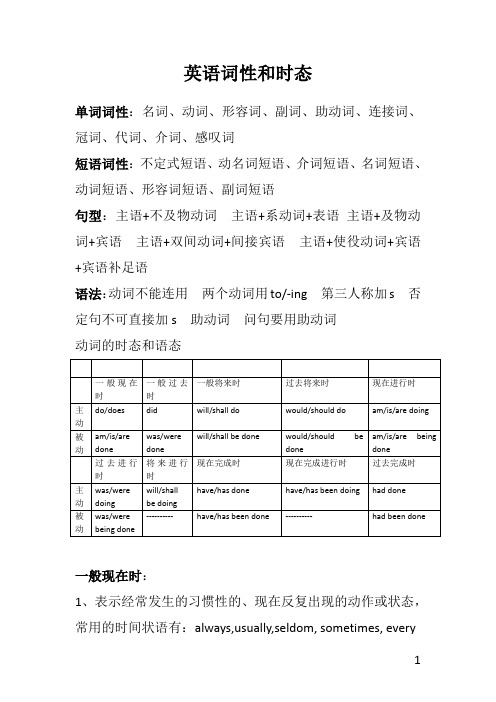
英语词性和时态单词词性:名词、动词、形容词、副词、助动词、连接词、冠词、代词、介词、感叹词短语词性:不定式短语、动名词短语、介词短语、名词短语、动词短语、形容词短语、副词短语句型:主语+不及物动词主语+系动词+表语主语+及物动词+宾语主语+双间动词+间接宾语主语+使役动词+宾语+宾语补足语语法:动词不能连用两个动词用to/-ing 第三人称加s 否定句不可直接加s 助动词问句要用助动词动词的时态和语态一般现在时:1、表示经常发生的习惯性的、现在反复出现的动作或状态,常用的时间状语有:always,usually,seldom, sometimes, everyday, now and then, once a week等。
2、表示眼下或目前等现在时间所发生的动作或存在的状态,这种状态带有一定的持续性。
3、表示客观事实或普遍真理。
4、书报的标题,故事的叙述,小说、戏剧、电影等情节介绍,图片的说明等。
5、时间表、时刻表、日程表、节目单、课程表等按规定将要发生的动作,只限于go, arrive, leave, start, stay, return, begin, come等动词。
6、在时间、条件、方式、让步状语从句中,表示将来的动作。
注意:一般现在时可以用于定语从句或宾语从句中表示将来。
7、用在某些表达中,表示现在正在发生的动作或存在的状态。
一般过去时:1、表示在过去某一时间点发生的动作或所处的状态,与现在没有关系。
常用的时间状语有:yesterday, last night, at that time等。
2、表示在过去某一段时间里反复出现的动作或状态,与现在没有关系。
3、用used to do或would do表示过去经常或反复发生的动作。
4、有些情况发生的时间没清楚表明,但实际上是“刚才,刚刚”发生的,属于过去时间,应使用过去时态。
常见的有I didn’t know…或I forgot…等。
5、一般过去时可与today, this week, this month等时间状语连用。
英语中的五大短语类型
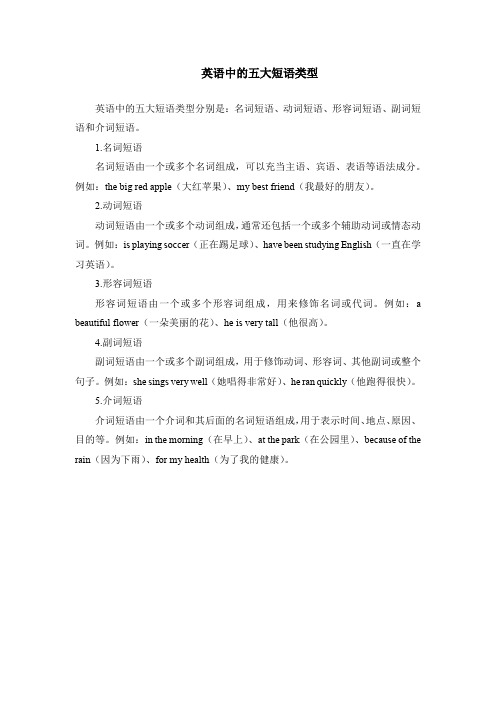
英语中的五大短语类型
英语中的五大短语类型分别是:名词短语、动词短语、形容词短语、副词短语和介词短语。
1.名词短语
名词短语由一个或多个名词组成,可以充当主语、宾语、表语等语法成分。
例如:the big red apple(大红苹果)、my best friend(我最好的朋友)。
2.动词短语
动词短语由一个或多个动词组成,通常还包括一个或多个辅助动词或情态动词。
例如:is playing soccer(正在踢足球)、have been studying English(一直在学习英语)。
3.形容词短语
形容词短语由一个或多个形容词组成,用来修饰名词或代词。
例如:a beautiful flower(一朵美丽的花)、he is very tall(他很高)。
4.副词短语
副词短语由一个或多个副词组成,用于修饰动词、形容词、其他副词或整个句子。
例如:she sings very well(她唱得非常好)、he ran quickly(他跑得很快)。
5.介词短语
介词短语由一个介词和其后面的名词短语组成,用于表示时间、地点、原因、目的等。
例如:in the morning(在早上)、at the park(在公园里)、because of the rain(因为下雨)、for my health(为了我的健康)。
形容词 副词短语用法英语

形容词 副词短语用法英语形容词和副词短语在英语中是非常常见的语言元素,它们可以用来描述名词、动词、形容词或其他副词,使语言更加生动、具体、准确。
以下是形容词和副词短语的一些常见用法及详细解答:1. 形容词短语:- 形容词+介词短语:例如,“He is interested in music.” 中的“interested in”就是一个形容词短语,用于描述主语“he”对音乐的兴趣程度。
- 形容词+不定式:例如,“She is easy to get along with.” 中的“easy to get along with”就是一个形容词短语,用于描述主语“she”的性格特点。
- 形容词+现在分词:例如,“The movie is very interesting.” 中的“interesting”就是一个形容词短语,用于描述主语“the movie”的性质。
- 形容词+过去分词:例如,“He is worried about his exam.” 中的“worried about”就是一个形容词短语,用于描述主语“he”的心情状态。
2. 副词短语:- 副词+介词短语:例如,“She works very hard at school.” 中的“very hard at”就是一个副词短语,用于描述谓语动词“works”的程度和方式。
- 副词+不定式:例如,“He ran too fast to catch up with us.” 中的“too fast to”就是一个副词短语,用于描述谓语动词“ran”的速度。
- 副词+现在分词:例如,“She is constantly talking on the phone.” 中的“constantly talking”就是一个副词短语,用于描述主语“she”的行为。
- 副词+过去分词:例如,“The window was broken by the strong wind.” 中的“broken by”就是一个副词短语,用于描述谓语动词“was”的状态。
短语结构类型的语法规则

短语结构类型的语法规则1. 名词短语(NP)- 名词短语是指以名词为核心的短语结构。
- 名词短语可以包含限定词、形容词、副词等修饰词,以及其他短语作为补语。
- 例子:[a big dog]、[the book on the table]、[his best friend]2. 动词短语(VP)- 动词短语是指以动词为核心的短语结构。
- 动词短语可以包含名词短语、副词短语、介词短语等作为宾语、补语、状语等。
- 例子:[likes to swim]、[is reading a book]、[gave her a present]3. 形容词短语(AdjP)- 形容词短语是指以形容词为核心的短语结构。
- 形容词短语可以包含副词短语等修饰词,以及其他短语作为补语。
- 例子:[very beautiful]、[extremely cold]、[interested in music]4. 副词短语(AdvP)- 副词短语是指以副词为核心的短语结构。
- 副词短语可以包含其他短语作为修饰词,以及其他短语作为补语。
- 例子:[very quickly]、[quite often]、[outside the house]5. 介词短语(PP)- 介词短语是指以介词为核心的短语结构,通常由介词与名词短语组成。
- 介词短语可以作为名词短语、动词短语、形容词短语、副词短语的补语或修饰语。
- 例子:[in the park]、[on the table]、[with a smile]6. 非限定性从句(Non-restrictive Clause)- 非限定性从句是指在句子中对主句进行补充说明,但不对主句起限制作用的从句。
- 非限定性从句通常由关系代词或关系副词引导。
- 例子:[The book, which was written by a famous author, is very popular.]以上是常见的短语结构类型及其语法规则。
英语短语类型分类

英语短语类型分类英语短语是由两个或更多单词组成的语言单位,它们通常在英语中被广泛使用。
根据读者的需要和目的,英语短语可以分为许多不同的类型。
下面我们来详细看看英语短语类型的分类。
一、名词短语名词短语指的是由一个或多个名词组成的短语。
它可以作为主语、宾语、补语、和定语等。
例如:“A beautiful garden”,“a cup of coffee”。
二、代词短语代词短语指的是由代词和修饰词组成的短语。
它可以代替一个名词作为主语、宾语、补语和定语等。
例如:“He is talking to her”,“They are listening to us”。
三、形容词短语形容词短语指的是由一个形容词和修饰词组成的短语。
它一般作为定语,修饰名词或代词。
例如:“The man is tall”,“The dress is red”。
四、副词短语副词短语指的是由一个副词和修饰词组成的短语。
它可以修饰动词、形容词、副词和整个句子。
例如:“She singsbeautifully”,“The dog runs very fast”。
五、介词短语介词短语指的是由一个介词、它后面的名词或代词和修饰词组成的短语。
它通常被用作定语、状语、和宾语等。
例如:“The car is in the garage”,“I’m going to the mall with my friends”。
六、动词短语动词短语指的是由动词和修饰词组成的短语。
它通常用于作谓语、宾语补语、状语和定语等。
例如:“He is playingbasketball”,“She is writing a book”。
七、感叹短语感叹短语指的是表示惊讶、赞扬、恶心、悲伤或愤怒等感情的短语,通常包含一个或多个形容词或副词。
例如:“How beautiful the flowers are!”,“What a great idea!”。
以上是英语短语的七种类型分类,每种类型都有它的具体用途和语法结构。
英语副词短语举例

英语副词短语举例英语中,副词短语是一种由副词或副词词组构成的短语结构,用来修饰动词、形容词、副词或整个句子。
副词短语在句子中起到提供更多细节和描述的作用,丰富了句子的意义。
本文将介绍一些常见的英语副词短语,并通过举例说明它们的用法和功能。
1. 形容词副词短语形容词副词短语用来修饰形容词,增强形容词的程度或范围。
以下是一些常见的形容词副词短语:- Very slowly(非常慢地):这个副词短语用来修饰动词,表示动作的缓慢程度。
例如:She walked very slowly across the room(她非常慢地走过房间)。
- Quite often(相当经常):这个副词短语用来修饰副词,表示副词所描述的动作或状态的频率。
例如:He goes to the gym quite often(他相当经常去健身房)。
- Too loud(太大声):这个副词短语用来修饰形容词,表示形容词所描述的特征过于突出或超出了合理范围。
例如:The music was too loud(音乐太大声了)。
2. 时间副词短语时间副词短语用来表示动作发生的时间,或者描述动作的持续时间。
以下是一些常见的时间副词短语:- In the morning(在早晨):这个副词短语表示动作发生的具体时间点。
例如:I usually have breakfast in the morning(我通常在早晨吃早餐)。
- For a while(一段时间):这个副词短语用来描述动作或状态的持续时间。
例如:She sat on the bench for a while(她在长椅上坐了一会儿)。
- After school(放学后):这个副词短语表示动作发生的相对时间。
例如:We always play soccer after school(我们放学后总是玩足球)。
3. 地点副词短语地点副词短语用来描述动作的地点或者行为的方向。
以下是一些常见的地点副词短语:- In the garden(在花园里):这个副词短语表示动作发生的具体地点。
形容词、副词、介词和动词短语

(4). call for sb. =go and pick sb. up 去接某人 I’ll call for you at four.= I’ll go and pick you up at four. 我将于4点去接你。
(2)比较级+than+比较对象(less+原级+比 较对象)
高三英语学生学习课件
(3)比较级+and+比较对象或more and more +原级
(4)the+比较级…,the+比较级… (5)the+比较级+of the two (6)the+最高级(+单数可数名词) +of/among+复数名词或in+单数名词 (7)be one of/among+ the+最高级+复数 名词 (8)the last+原级(+单数可数名词) +of/among+复数名词或in+单数名词
词
⊙形容词作定语及多个时的 位置顺序 ⊙形容词和副词的比较等
用法 ⊙何时形容词后置 ⊙-ly结尾的形容词 ⊙定语形容词和表语形容
⊙词形一致的形容词和副
高三英语学生学习课件
介 ●
词
⊙介词基本用法及易混淆介词的区
别
⊙常见的各种介词搭配及意义
⊙易错常考介词及其搭配
⊙形状相似动词的误用
●
动 词
⊙及物动词与不及物动词的误用 ⊙动词短语的形式和意义
我希望不会整天下雨。
He stole a book from the shelf. steal+偷窃物+from+人或地点
英语中形容词和副词的用法

英语中形容词和副词的用法一、形容词形容词主要用来说明或修饰名词或代词,增加或补充其含义,从而限制或缩小其适用的范围。
表示人或事物的性质、状态和特征。
形容词可在句中充当定语修饰名词、代词,也可作表语表示主语的状态、特征,也可作补语、状语。
作定语:He is a very good swimmer.作表语:He looks very healthy.作宾语补足语:The rain made the ground wet.作主语补足语:She was considered smart.作主语或宾语:The old are respected here and there.The new replaces the old.作状语:Tired and hot, we had to stop to have a break.二、副词副词主要修饰动词、形容词或其他副词,有时也可用来修饰全句。
说明时间、地点、方式、程度等概念。
作状语:It's raining heavily.修饰形容词:It's rather a difficult job.修饰介词短语:The arrow hit the apple right in the middle.修饰从句:This is exactly what she said.修饰名词、代词及数词:Life here is full of joy.She is going to extend her stay there for about two weeks. Nearly everybody came to party.作表语:The class is over.作介词宾语:Who is calling me from downstairs?作定语:Are you content with the life here?作补语:We were shown by the young man.。
高中英语知识点归纳副词修饰动词形容词和副词的位置

高中英语知识点归纳副词修饰动词形容词和副词的位置副词修饰动词、形容词和副词的位置是高中英语中的一个重要知识点。
正确使用副词可以使语言更加丰富、准确,帮助我们表达更准确的意思。
下面将对副词修饰动词、形容词和副词的位置进行归纳总结。
一、副词修饰动词:1. 直接在动词前修饰,一般副词以单音节为主,如:- He quickly ran to catch the bus.- They carefully prepared for the exam.2. 与实义动词连用时,放在助动词或情态动词之后:- She can easily solve the math problem.- The team will definitely win the game.3. 在系动词后作表语,说明主语的状态或特征:- The tea tastes good.- The house looks beautiful.二、副词修饰形容词:1. 直接在形容词前修饰,表示程度、强调等,如:- She is very intelligent.- He is extremely tired.2. 与形容词连用时,放在系动词后面:- The book is really interesting.- The movie was quite boring.三、副词修饰副词:1. 直接在被修饰的副词前修饰,表示程度、频率等,如:- He speaks English quite fluently.- They often go swimming together.2. 修饰副词短语时,放在副词短语的前面:- She can dance really well.- They arrived home very late.需要注意的是,在句子中副词的位置并不是固定的,有时候可以根据需要移到不同的位置。
例如,为了强调某个副词修饰的对象,可以将副词提前置于句首或句末。
高中英语语法知识:形容词和副词
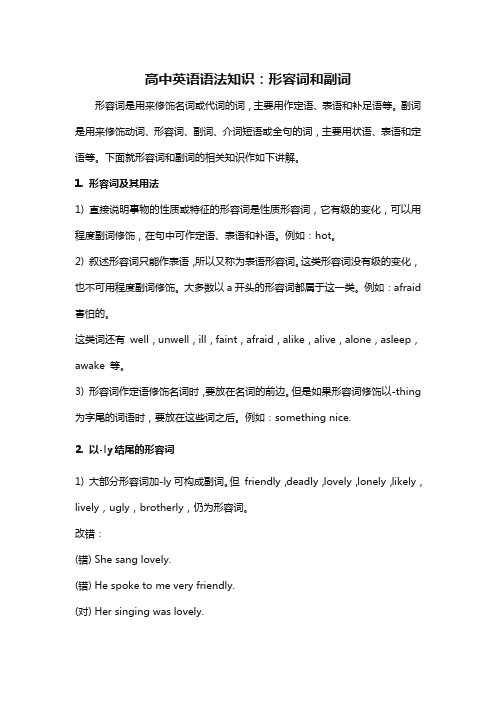
高中英语语法知识:形容词和副词形容词是用来修饰名词或代词的词,主要用作定语、表语和补足语等。
副词是用来修饰动词、形容词、副词、介词短语或全句的词,主要用状语、表语和定语等。
下面就形容词和副词的相关知识作如下讲解。
1. 形容词及其用法1) 直接说明事物的性质或特征的形容词是性质形容词,它有级的变化,可以用程度副词修饰,在句中可作定语、表语和补语。
例如:hot。
2) 叙述形容词只能作表语,所以又称为表语形容词。
这类形容词没有级的变化,也不可用程度副词修饰。
大多数以a开头的形容词都属于这一类。
例如:afraid 害怕的。
这类词还有well,unwell,ill,faint,afraid,alike,alive,alone,asleep,awake 等。
3) 形容词作定语修饰名词时,要放在名词的前边。
但是如果形容词修饰以-thing 为字尾的词语时,要放在这些词之后。
例如:something nice.2. 以-ly结尾的形容词1) 大部分形容词加-ly可构成副词。
但friendly,deadly,lovely,lonely,likely,lively,ugly,brotherly,仍为形容词。
改错:(错) She sang lovely.(错) He spoke to me very friendly.(对) Her singing was lovely.(对) He spoke to me in a very friendly way.2) 有些以-ly 结尾既为形容词,也为副词,如daily,weekly,monthly,yearly,early等。
例如:The Times is a weekly paper. 《时代周刊》为周刊。
The Times is published weekly. 《时代周刊》每周发行一期。
3. 用形容词表示类别和整体1) 某些形容词加上定冠词可以泛指一类人,与谓语动词的复数连接,如the dead,the living,the rich,the poor,the blind,the hungry等。
八年级英语语法之形容词、副词、连词、非谓语动词

一、形容词和副词概述:形容词是指那些用来描述或修饰名词(或代词)的一类词。
一般放在其所修饰的名词之前。
在句中用作定语、表语、补语、状语等。
多数形容词具有比较等级。
副词是用以修饰动词、形容词、句子以及其他副词的词。
在形式上,许多副词带有后缀ly。
形容词、副词是中学英语重要语法项目,也是中考重要考查内容。
中考考点1.形容词和副词的原级、比较级和最高级的构成规则、基本句型及其用法。
2.形容词作表语和定语的用法。
3.副词作状语的用法。
考点一形容词1.形容词的一般用法1)形容词作表语,表明主语的性质和特征,放在连系动词之后。
如:Computers are very useful in our everyday life.Leaves turn yellow in autumn.2)形容词作定语,修饰名词或不定代词,通常放在名词之前,不定代词之后。
如:This is an unhealthy diet.There is nothing important in today’s newspaper.[注意] 由连字符连接起来的复合形容词中的名词只能用单数形式。
如:an eight-year-old boy 一个8岁的男孩3)形容词作宾语补足语,放在宾语之后,与其构成复合宾语。
如:You should keep your classroom clean and tidy.I found it difficult to get on well with the manager。
(4)数词+形容词,表示长、宽、高、深以及年龄。
如:five thousand kilometers long五千多千米长(5)the+形容词,表示一类人或物。
如:the old 老人(6)表语形容词。
这些形容词只能位于系动词后面作表语。
如:alone, awake, alive, well(健康的), ill, frightened等。
如:The boy is alone.(正)The alone boy is here.(误)(7)只能作定语的形容词。
英语形容词,副词及动词短语
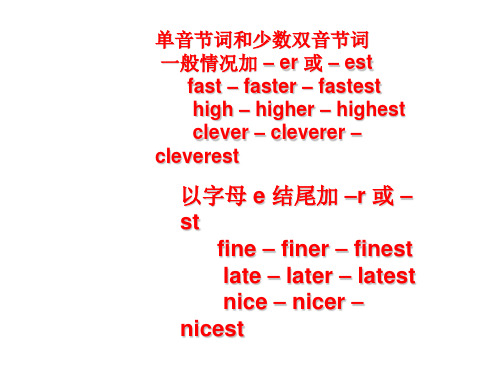
专题八
动词分类及动词短语
2.may和might may (might) 意为“可以”,表示说话人同意、许可或请 求对方许可,也可表示祝愿。might 是may 的过去式,表示可 能性更小、语气更加委婉。如: May I take some photos here? 我可以在这儿拍照吗? May you be happy.祝你开心。
• 掌握几种同义句转换 • 1. He is taller than any other student in his class. • = He is taller than the other students in his class. • = He is taller than any of the other students in his class. • = He is the tallest (student)in his c专题八 动词分类及动词短语
3 . 表 象 系 动 词 : 表 示 “ 看 起 来 好 像 ” , 主 要 有 seem, appear, look等。如:
My mother seems very satisfied with my progress.
妈妈对我的进步似乎很满意。 4 .感官系动词:表示“ …… 起来”,主要有 feel( 摸起来, 感觉), smell(闻起来), sound(听起来), taste(尝起来,吃起来)等。 如:
• 部分双音节和多音节词 • 在词前加 more 或 most • slowly - more slowly - most slowly • easily - more easily - most easily • carefully - more carefully • - most carefully
英语词组分类

英语词组分类可以根据不同的标准进行划分。
以下是一些常见的英语词组分类及详细描述:1、按词性分类:名词短语:由名词、代词和名词短语组成的短语,例如“a beautiful flower”、“all the students”。
动词短语:由动词和其宾语、补语、状语组成的短语,例如“eat an apple”、“run quickly”。
形容词短语:由形容词和其修饰语组成的短语,例如“very happy”、“quite certain”。
副词短语:由副词和其修饰语组成的短语,例如“very much”、“just now”。
2、按组成元素分类:名词+动词+介词短语:这种短语由名词、动词和介词组成,例如“listen to the radio”、“eat with fork and knife”。
形容词+名词短语:这种短语由形容词和名词组成,例如“beautiful flowers”、“nice weather”。
副词+动词短语:这种短语由副词和动词组成,例如“suddenly appear”、“quickly run”。
3、按功能分类:称谓短语:这种短语用于称呼某人或某物,例如“Mr. Smith”、“Mrs. Johnson”。
动词短语:这种短语表达一个动作或状态,例如“eat anapple”、“write a letter”。
修饰短语:这种短语修饰或补充说明一个词、短语或句子,例如“very fast”、“in the morning”。
连接短语:这种短语用于连接两个或多个句子或短语,例如“and then”、“but not”。
4、按语法结构分类:并列短语:这种短语由两个或多个并列的词、短语或句子组成,例如“and so on”、“or else”。
从属短语:这种短语是另一个短语的一部分,例如“in the morning”、“to go to school”。
短语结构常见类型介绍

短语结构常见类型介绍短语结构是指由词构成的固定搭配,在语法上成为一个整体,代表一个特定的意义。
在英语中,常见的短语结构主要有名词短语、动词短语、形容词短语和副词短语。
1. 名词短语(Noun Phrase):名词短语由一个名词作为核心,可以由冠词、形容词、副词等修饰语组成。
常见的名词短语有:- 冠词+名词:a book (一本书)- 形容词+名词:a big house (一座大房子)- 名词的所有格:John's car (约翰的车)- 名词+名词修饰:a car factory (汽车工厂)2. 动词短语(Verb Phrase):动词短语由一个动词作为核心,可以由副词、形容词、介词短语等修饰语组成。
常见的动词短语有:- 助动词+动词:will go (将要去)- 系动词+形容词:look happy (看起来快乐)- 副词+动词:quickly run (快速奔跑)- 动词+介词短语:think of (考虑)3. 形容词短语(Adjective Phrase):形容词短语由一个形容词作为核心,可以由副词、介词短语等修饰语组成。
常见的形容词短语有:- 形容词+名词:pretty girl (漂亮的女孩)- 形容词+介词短语:angry with (对...生气)- 形容词+副词:very beautiful (非常漂亮)- 副词+形容词:quite good (相当好)4. 副词短语(Adverb Phrase):副词短语由一个副词作为核心,可以由程度副词、介词短语等修饰语组成。
常见的副词短语有:- 副词:quickly (快速地)- 副词+副词:very quickly (非常快速地)- 副词+介词短语:too late for (对于太晚了)以上是一些常见的短语结构类型,通过不同的修饰语的组合,能够表达出丰富的语义。
需要注意的是,短语结构的修饰语可以是单个词语,也可以是由其他短语结构构成的复合修饰语。
英语形容词、副词及用法

比较级和最高级的构成
4. 少数以y, er, ow, ble,ple 结尾的双音节词,末尾加er 和est(以y结尾的词,如y前是辅音字母,把y变成i,再加 er和est,以e结尾的词仍只加r和st)
More/most beautiful
比较级和最高级的不规则变化形式
特殊 good/well bad/badly many/much
little
old
far
比较级 better worse more
less older(年龄)老
elder(年长) farther(距离远) further(深造)
最高级 best worst most least oldest eldest farthest furthest
这个房间是那个房间的3倍大。 This room is 3 times as big as that one . This room is 3 times the size of that one. This room is twice bigger than that one .
四 形容词、副词
目 录
01 adj.的作用 02 adv.的分类 03 adv.的作用 04 adj.\adv.等级的构成及运用 05 adj.\adv.的辨析
Warm up
形容词:用来描写、修饰名词或代词,表示人或事物的性 质、状态和特征。 副词:修饰动词、形容词、其他副词、介词短语或全句等, 表示时间、点
angr y(生气的) -angrier-angriest clever (聪明的)-cleverer- cleverest narrow(狭窄的) -narrower-norrowest able(能够) -abler- ablest simple(简单的) -simpler-simplest 5. 其他双音节和多音节词都在前面加单词more和most different wonderful beautiful
- 1、下载文档前请自行甄别文档内容的完整性,平台不提供额外的编辑、内容补充、找答案等附加服务。
- 2、"仅部分预览"的文档,不可在线预览部分如存在完整性等问题,可反馈申请退款(可完整预览的文档不适用该条件!)。
- 3、如文档侵犯您的权益,请联系客服反馈,我们会尽快为您处理(人工客服工作时间:9:00-18:30)。
Could I borrow your pen? 我可以借你的钢笔吗? 专题八 动词分类及动词短语
(2)can 意为“能、会”时,相当于be able to (适用于各种 时态),can 和could 只能用于现在时和过去时。如:
A few months later, I'll be able to swim alone.
• 部分双音节和多音节词 • 在词前加 more 或 most • slowly - more slowly - most slowly • easily - more easily - most easily • carefully - more carefully • - most carefully
单音节词和少数双音节词 一般情况加 – er 或 – est fast – faster – fastest high – higher – highest clever – cleverer – cleverest
以字母 e 结尾加 –r 或 – st fine – finer – finest late – later – latest nice – nicer – nicest
系动词
一、分类 1.表示状态变化的系动词。 become , get , go , grow , turn 2.表示感官的系动词。 look , feel , smell ,sound , taste 3.表示持续的系动词。 keep , stay , remain 二、用法 1) 系动词+adj 2) 系动词无被动
• good/well – better – best • many/much – more – most • little – less – least • far – farther – farthest • ( far – further – furthest ) • bad/badly/ill – worse – worst
专题八
动词分类及动词短语
3.must和have to
(1)must 意为“必须,应该,一定,准是”,表示说话人 认为有必要做某事,或命令、要求别人做某事以及对事物的推 测。如:He must be working in his office. 他一定在办公室工 作呢。 (2)must 和 have to 的区别: must 表示说话人的主观意愿; have to 表示客观需要。如: I must do my homework first. 我必须首先做家庭作业。
• 重读闭音节、末尾只有一个辅音 • 字母时双写加 –er 或 –est • fat – fatter – fattest • big – bigger – biggest • thin – thinner – thinnest
• 以辅音字母加 y 结尾变 y • 为 i 加 –er 或 –est • early – earlier – earliest • easy – easier – easiest • lucky – luckier – luckiest
┃情态动词┃ 情态动词表示说话人的语气、情态,无人称和数的变化。 情态动词有自己的词汇意思,但不能独立作谓语,其后须跟动 词原形。使用频率较高的情态动词有can (could), may (might), must, need, shall (should), will (would)及半情态动词have to, had better。 1.can和could (1)can(could)表示说话人能、可以、同意、准许,以及客 观条件许可做某事。could可表示委婉语气。如:
We are playing an interesting game.
我们正在玩一个有趣的游戏。
专题八 动词分类及动词短语
┃系动词┃ 系动词亦称连系动词。本身有词义,但不能单独用作谓语, 后边必须跟表语。具体分类及用法如下: 1.状态系动词:只有be一词。如: They are always very happy. 他们总是很高兴。 2.持续系动词:表示主语继续或保持一种状况或态度, 主要有keep, remain, stay, rest, lie, stand。如: I hope you'll keep fit.
• 可用much, still, a little, even, far,three years等表示程度的状语来修饰比较级 • *She is much taller than Mrs.Liu. • *He is three years older than I. • *This problem is a little more difficult than the other one.
This kind of cloth feels very soft.
这种布摸起来很柔软。 专题八 动词分类及动词短语
5 .变化系动词:表示主语变成什么样,主要有 become, grow, turn, fall, get, go, come, run等。如:
The small town is becoming busier and busier.
几个月后,我将能单独游泳。 (3)can't表示否定推测。如: That can't be Mr Wang. He has gone to Beijing. 那肯定不是王老师。他已经去北京了。
专题八
动词分类及动词短语
2.may和might may (might) 意为“可以”,表示说话人同意、许可或请 求对方许可,也可表示祝愿。might 是may 的过去式,表示可 能性更小、语气更加委婉。如: May I take some photos here? 我可以在这儿拍照吗? May you be happy.祝你开心。
• 几种比较级的使用句型 • 1.“ 比较级 + and + 比较级 ” • 表示“ 越来越······ ” • *Your English is getting better and better. • 你的英语越来越好了。 • *These days more and more people are learning English. • 现在学英语的人越来越多了。
• 掌握几种同义句转换 • 1. He is taln his class. • = He is taller than the other students in his class. • = He is taller than any of the other students in his class. • = He is the tallest (student)in his class
小镇变得越来越忙碌。 6.终止系动词:主要有prove, turn out(结果是,证明是) 等。如: My plan turned out a success.我的计划成功了。 [提醒]有些系动词也是实义动词,可单独作谓语。如: He fell ill yesterday.他昨天病了。 专题八 动词分类及动词短语
• 3) 在表示 “和· · · · · · 一样······” 和 “不及······” 这类概念时,可以用 “as+原级+as” 和 “not as(so)+原级+as”的句型 • *Our teacher is as busy as before. • *He does not run so (as) fast as I.
• 2. “the + 比较级,the + 比较级” • 表示“ 越· · · · · · 就越······ ” • *The more, the better. • 越多越好。 • *The busier he is, the happier he feels. • 他越忙越高兴。
• .“ more (less) than ”表示 • “不止,不到” • *She is more than thirty. • 她三十多岁了。 • *The lightest weighs less than 50 • kilograms. • 最轻的不到五十公斤。
┃助动词┃ 协助主要动词构成谓语动词的词叫助动词。助动词是语法 功能词,自身没有词义,不可单独使用。 1.帮助构成疑问句或否定句句式的助动词有do, does, did 及其否定形式。如: Did you go home last week? 上周你回家了吗?
2.帮助构成时态的助动词有be, have, shall, will等。如:
• I prefer maths to English. • =I like maths better than English. • 4. The box is too heavy for him to carry. • = The box is so heavy that he can’t carry it. • = The box is not light enough for him to carry.
• .“more or less”表示“差不多,或多或少” • *The problem is more or less solved. • 这个问题差不多已经解决了。 • *Is it straight? – More or less. • 它直吗? – 差不多吧。
• 用or连接两项需作比较的内容时,须用比 较级;若or连接三项或三项以上的内容时, 则须用最高级 • *Who is taller, Mary or Jane? • *Which is the biggest, the sun, the moon or the earth?
It is raining hard outside. I have to stay at home. 外面雨下 得很大,我不得不待在家里。 专题八 动词分类及动词短语
4.need的用法
